|
Music Reviews
Alternative
Blues
Books
Christmas
Classic Rock
Country
Jazz
Lounge
Oldies
Power Pop
Punk & New Wave
Reggae
Rhythm & Blues
Seventies
Texas
Special Features
Randy's Rodeo
Sex Pistols
Motown
Halloween
Valentine's Day
Information
About Me
Feedback
Links
User's Guide
Support Me
Amazon
iTunes
Sheet Music Plus
|
Sock it to me, Santa! Visit my other website, www.hipchristmas.com Visit my other website, www.hipchristmas.com
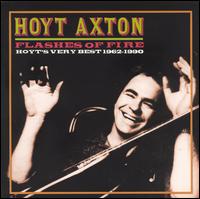 When Hoyt
Axton died in 1999, one of the first words inscribed in his obituaries was "songwriter." And,
without a doubt, it was as a songwriter - not a performer - that the amiable Oklahoman
made his mark. Over the years, Axton penned major hits for the Kingston Trio ("Greenback
Dollar"), Steppenwolf ("Snowblind Friend," "The Pusher"),
Three Dog Night ("Joy To The World," "Never Been To Spain"),
and Ringo Starr ("The No No Song"). On his own, Axton charted just one
single on the pop charts, "When The Morning Comes," a duet with Linda
Ronstadt that limped its way to #54 in 1974. He fared much better on the country
charts, notching a total of 14 entries including several that reached the Top 20 - two of them Top 10. When Hoyt
Axton died in 1999, one of the first words inscribed in his obituaries was "songwriter." And,
without a doubt, it was as a songwriter - not a performer - that the amiable Oklahoman
made his mark. Over the years, Axton penned major hits for the Kingston Trio ("Greenback
Dollar"), Steppenwolf ("Snowblind Friend," "The Pusher"),
Three Dog Night ("Joy To The World," "Never Been To Spain"),
and Ringo Starr ("The No No Song"). On his own, Axton charted just one
single on the pop charts, "When The Morning Comes," a duet with Linda
Ronstadt that limped its way to #54 in 1974. He fared much better on the country
charts, notching a total of 14 entries including several that reached the Top 20 - two of them Top 10.
Despite those accomplishments, most Americans know Hoyt Axton - if they know him
at all - as either the son of Mae Axton, who wrote "Heartbreak Hotel" for
Elvis Presley, or as an actor. Also an athlete and an artist, Mae's multifaceted
progeny debuted on the small screen (Bonanza, 1965), and his imposing, burly, yet
reassuring persona provided him steady work as a character actor for the rest of
his life. Usually playing best friends and father figures, Hoyt appeared in films
as distinguished as The
Black Stallion and Heart
Like A Wheel, and he captured his biggest audience in Gremlins.
He even had his own TV show in the early 80's.
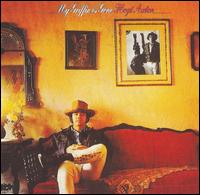 For
me, however, Hoyt Axton will always be the man who wrote and sang the ultimate ode
to the working life, "Boney Fingers," the song that answers the
age-old question, "Work your fingers to the bone, what do you get?" For
many years, I owned a scratchy 45-rpm copy of "Boney Fingers" on A&M's "Forget-Me-Not" reissue
imprint, and I'd drag it out every time I felt my work-a-day routine weighing me
down. Something about Hoyt's sad-sack recitation of his myriad domestic woes (spiritedly
accompanied by vocalist Renee Armand) and the funny, fatalistic conclusion of his
lyrics gave me comfort. For
me, however, Hoyt Axton will always be the man who wrote and sang the ultimate ode
to the working life, "Boney Fingers," the song that answers the
age-old question, "Work your fingers to the bone, what do you get?" For
many years, I owned a scratchy 45-rpm copy of "Boney Fingers" on A&M's "Forget-Me-Not" reissue
imprint, and I'd drag it out every time I felt my work-a-day routine weighing me
down. Something about Hoyt's sad-sack recitation of his myriad domestic woes (spiritedly
accompanied by vocalist Renee Armand) and the funny, fatalistic conclusion of his
lyrics gave me comfort.
"Boney Fingers," actually, was the biggest hit of Axton's career, peaking
at #8 on Billboard's country chart. Like much of Axton's music, the song walks a
fine line between folk, country, and rock - which perhaps explains why it never shows
up on any of the innumerable country hits collections of that litter the marketplace.
But, I treasure the song so much that I eventually plunked down $20 for
an Australian import, Flashes
Of Fire: Hoyt's Very Best 1962-1990 (Raven, 2004), if only to replace my haggard
vinyl single.
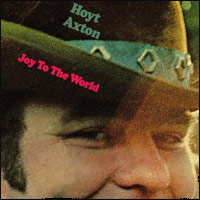 Smart
move, because my purchase afforded me the chance to hear Axton's own versions of
all those hits he wrote for other people, and also to experience in depth the music
he crafted with such skill and good humor during his long career. That said, Flashes
Of Fire misleads slightly, as it barely touches upon the formative years
of Axton's career. Beginning with The
Balladeer (1962, reissued in 1963 as Greenback
Dollar), he recorded numerous albums in the burgeoning folk idiom for independent
labels like Horizon, Vee Jay, and Surrey. Fittingly, Flashes
Of Fire begins with a live recording of "Greenback Dollar" (cowritten
with Ken Ramsey) recorded at the Troubadour, a famed Los Angeles folkie hangout.
But then, after "Smoky," a rare 1966 single, the disc leaps ahead to Axton's
1969 major label debut, My
Griffin Is Gone, released by Columbia - but then, that's where our story really gets going. Smart
move, because my purchase afforded me the chance to hear Axton's own versions of
all those hits he wrote for other people, and also to experience in depth the music
he crafted with such skill and good humor during his long career. That said, Flashes
Of Fire misleads slightly, as it barely touches upon the formative years
of Axton's career. Beginning with The
Balladeer (1962, reissued in 1963 as Greenback
Dollar), he recorded numerous albums in the burgeoning folk idiom for independent
labels like Horizon, Vee Jay, and Surrey. Fittingly, Flashes
Of Fire begins with a live recording of "Greenback Dollar" (cowritten
with Ken Ramsey) recorded at the Troubadour, a famed Los Angeles folkie hangout.
But then, after "Smoky," a rare 1966 single, the disc leaps ahead to Axton's
1969 major label debut, My
Griffin Is Gone, released by Columbia - but then, that's where our story really gets going.
Like a lot of folkies as the 60's progressed, Axton had turned on, tuned in, and dropped out. His new music - let's call it psychedelic folk - reflected his new sensibilities. My
Griffin Is Gone signaled a new direction, but it's also heavier, darker, and more mystical than the music he would become known for. Still, it marked Axton's first steps towards the laid-back, good-humored sage he would soon become. Regardless, the same year, Steppenwolf's 1968 version of "The Pusher" appeared on the
Top 10 soundtrack to the counterculture epic, Easy
Rider. And that windfall, along with
the positive press surrounding My
Griffin Is Gone, raised Hoyt Axton's visibility to a new level. By the mid-1970's,
his folio included numerous Top 10 hits (Three Dog Night's "Joy To The
World" achieved #1), earning him the freedom to do pretty much whatever he wanted.
And what he wanted to do was create - to write, record, perform, draw - and live
the adventurous, laid-back life he sang about. Listening to Hoyt, one gets the impression
of a man greatly amused by life, passionate and engaged while at peace with his own
talents and foibles.
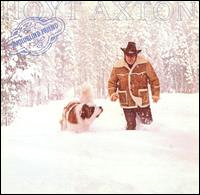 My
Griffin Is Gone featured a cast of session all-stars (including future slice of Bread Larry Knechtel and Elvis Presley guitarist James Burton) that became characteristic
of Axton's prodigious catalog. Over the years, Hoyt would be joined by
an
illustrious, if
motley, crew of guest stars, from Jim Messina to Nicolette Larson to Bob Lind
to Cheech & Chong.
Immediately, however, Axton switched to Capitol Records for two records (including Joy
To The World, 1971) before joining A&M Records for Less
Than The Song (1973). Over the next four years at A&M, he waxed his most
successful albums. One of these records, Life
Machine (1974), produced "Boney Fingers" and another, Road
Songs (1977) - a compilation, not a live album as one might expect - earned him the loftiest kudos of his career. The other two, Southbound (1975)
and Fearless (1976),
were his only albums to appear on Billboard's Top 200 pop album chart. My
Griffin Is Gone featured a cast of session all-stars (including future slice of Bread Larry Knechtel and Elvis Presley guitarist James Burton) that became characteristic
of Axton's prodigious catalog. Over the years, Hoyt would be joined by
an
illustrious, if
motley, crew of guest stars, from Jim Messina to Nicolette Larson to Bob Lind
to Cheech & Chong.
Immediately, however, Axton switched to Capitol Records for two records (including Joy
To The World, 1971) before joining A&M Records for Less
Than The Song (1973). Over the next four years at A&M, he waxed his most
successful albums. One of these records, Life
Machine (1974), produced "Boney Fingers" and another, Road
Songs (1977) - a compilation, not a live album as one might expect - earned him the loftiest kudos of his career. The other two, Southbound (1975)
and Fearless (1976),
were his only albums to appear on Billboard's Top 200 pop album chart.
After a two-album stint at MCA, Hoyt Axton founded his own label, Jeremiah Records,
named after the tippling bullfrog from "Joy To The World." Initially,
Axton's new venture met with success, scoring two Top 20 country singles with "Della
And The Dealer" and "Rusty Old Halo." Thereafter, Jeremiah earned
diminishing returns as Axton faded away as a singer and songwriter, focusing more
on his acting career - even writing the theme song to Flo, a spin-off of the hit
TV show Alice. Jeremiah - the label - croaked in 1982, though Greatest
Hits appeared in 1986. In 1984, Axton recorded a poorly-distributed album, American
Dreams (1984), portions of which were used to fill out his final studio effort, Spin
Of The Wheel, in 1990 (not counting his 1995 children's album, Jeremiah Was A Bullfrog). Hoyt Axton suffered a stroke in 1996, and he died in
1999.
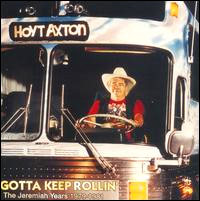 The
four Jeremiah albums were surveyed by Aussie imprint Raven under the banner Gotta
Keep Rollin': The Jeremiah Years 1979-1981 (1999), and most have been reissued
individually by either Raven or
UK label Edsel (who
have also dipped into Axton's MCA and Columbia catalogs). In fact, most phases
of Axton's career have been revisited during the digital age. Sadly, though, many
of these editions have been deleted and often fetch handsome prices as collector's
items. Collectables Records, for instance, briefly issued Gold (2001)
covering Axton's folk-oriented Vee Jay albums, but I've seen copies going for $100
or more. The
A&M Years (1998), a 2-CD collection from Europe, is a definitive overview
of Axton's most acclaimed period but has become scarce beyond reason. American
Originals (1993), a nearly complete compilation of Hoyt's two Capitol albums,
is almost as rare, though not as pricey. The
four Jeremiah albums were surveyed by Aussie imprint Raven under the banner Gotta
Keep Rollin': The Jeremiah Years 1979-1981 (1999), and most have been reissued
individually by either Raven or
UK label Edsel (who
have also dipped into Axton's MCA and Columbia catalogs). In fact, most phases
of Axton's career have been revisited during the digital age. Sadly, though, many
of these editions have been deleted and often fetch handsome prices as collector's
items. Collectables Records, for instance, briefly issued Gold (2001)
covering Axton's folk-oriented Vee Jay albums, but I've seen copies going for $100
or more. The
A&M Years (1998), a 2-CD collection from Europe, is a definitive overview
of Axton's most acclaimed period but has become scarce beyond reason. American
Originals (1993), a nearly complete compilation of Hoyt's two Capitol albums,
is almost as rare, though not as pricey.
All of which makes Flashes
Of Fire: Hoyt's Very Best 1962-1990 more attractive to cost-conscious consumers.
Though hardly cheap, it's a good value - 25 tracks running well over an hour.
Moreover, the song selection is probably as balanced as humanly possible given
the breadth of Hoyt Axton's repertoire and the abundance of labels for which
he recorded.
Due
in no small part to Keith Glass' informed, affectionate liner notes, Flashes
Of Fire lends historical perspective to Hoyt Axton's career. There could
be, as rock writer Ariel Swartley once said, "startling gaps in Axton's
sophistication." His sardonic, homespun humor often teetered precipitously
on the edge of appallingly cute, and his friendly, corn-fed hippie persona could
come across as more than a little affected.
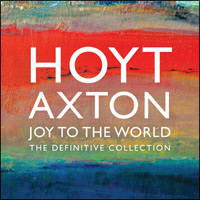 But, his love of music was undeniable. Many of Axton's songs - "Boney Fingers" among
them - could be considered novelties. If so, they are the best kind of novelties,
the kind that speak great truths while making us giggle. Others, like "Evangelina" or "Sweet
Misery" tells stories in vivid detail - like a well-read Jimmy Buffett, or
Harry Chapin minus the emotional blackmail. Ultimately, the Hoyt Axton found in
the grooves of his records wasn't that different from the characters he played
in his movies. As with a favorite uncle, we look forward to his visits,
and we always take away a bit of wisdom leavened with jocularity. But, his love of music was undeniable. Many of Axton's songs - "Boney Fingers" among
them - could be considered novelties. If so, they are the best kind of novelties,
the kind that speak great truths while making us giggle. Others, like "Evangelina" or "Sweet
Misery" tells stories in vivid detail - like a well-read Jimmy Buffett, or
Harry Chapin minus the emotional blackmail. Ultimately, the Hoyt Axton found in
the grooves of his records wasn't that different from the characters he played
in his movies. As with a favorite uncle, we look forward to his visits,
and we always take away a bit of wisdom leavened with jocularity.
Much later, and after much music industry consolidation, England's Hump Head Records issued Joy To The World: The Definitive Collection (2016), which combines a whopping 50 tracks from Axton's prime Capitol, A&M, and MCA recordings 1971-1978. By then, all of those catalogs were owned by mega-corporation Universal Music. But definitive? No, since it lacks any of Axton's earliest or latest recordings. And, like most Hump Head releases, it cuts corners to maximize profit - foregoing pictures of the artist, for instance. Nevertheless, it's a bonanza of music. [top of page]
 Selected Hoyt
Axton Albums Selected Hoyt
Axton Albums
[top of page]
 Essential Hoyt
Axton Songs Essential Hoyt
Axton Songs
- Boney Fingers (with
Renee Armand, 1974)
- Della And The Dealer (1979)
- Evangelina (1976)
- Flash Of Fire (1976)
- Heaven (1971)
- It's All Right Now (1969)
- Joy To The World (1971)
- Light This Candle (1977)
- Lion In The Winter (1975)
- Nashville (1975)
- Never Been To Spain (1971)
- The No No Song (1975)
- The Pusher (1971)
- A Rusty Old Halo (1979)
- Snowblind Friend (1969)
- Spin Of The Wheel (1990)
- Sweet Misery (1973)
- When The Morning Comes (with
Linda Ronstadt, 1974)
- Where Did The Money Go? (1980)
[top of page]
 Hoyt
Axton On The Web Hoyt
Axton On The Web
[top of page]
 Feedback Feedback
Your witty comments, impertinent questions, helpful suggestions, and angry denials
are altogether encouraged. Submit feedback via email;
submissions will be edited and posted at my discretion.
|
|